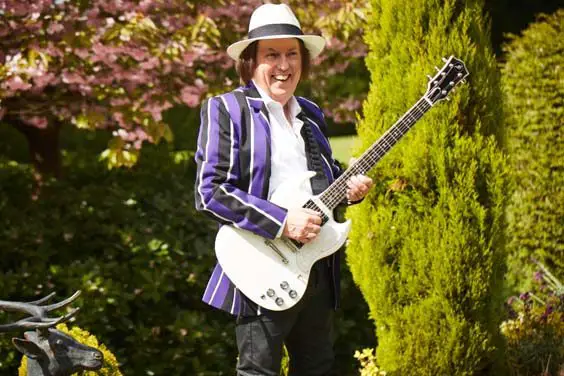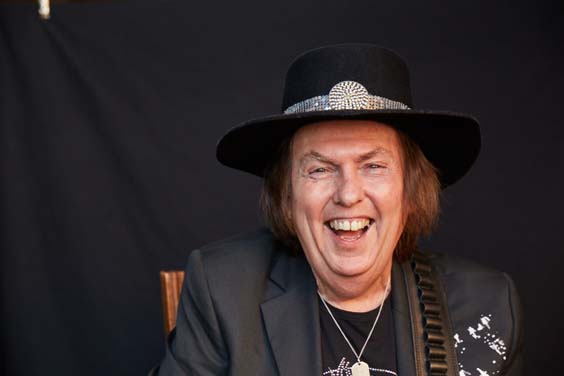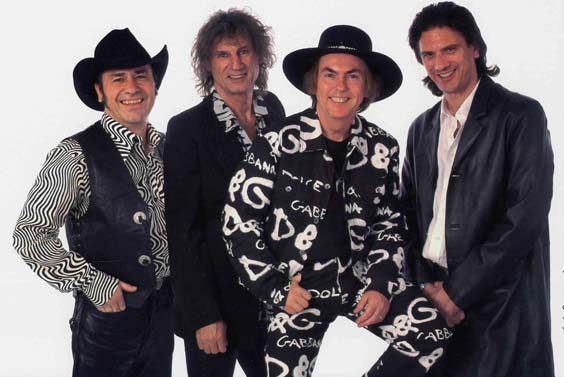An Interview with Slade Guitarist Dave Hill
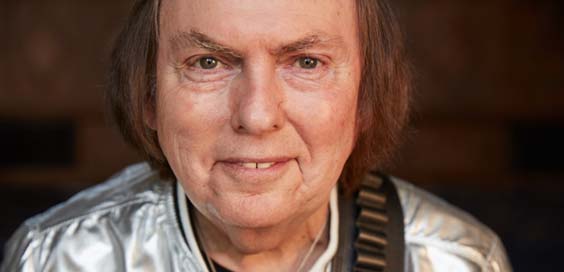
By Roger Crow
I grew up living in the next street to Dave Hill from Slade but never managed to speak to him. So 27 years after leaving our mutual stomping ground, it was a pleasure to chat to one of the most glam rockers of all time. Ahead of Slade’s UK tour, he discusses his new autobiography, So Here It Is; starring in my favourite rock film, and why ‘without Slade there would’ve been no Oasis‘.
At what point did you catch the showbiz bug?
We used to play skiffle music, which was just making a blinkin’ row on a washboard. That’s how I got started. I was on a stage running my fingers up and down a washboard, and I thought ’I quite like this’.
At one point Slade were the biggest group in the country. How did you keep your feet on the ground?
Well I think it was more than this country. It was generally the world, except for America. We were as big in Europe and all these places I’ve been to like Australia and Russia. You can’t comprehend what it was like in the rest of the world. Obviously you can comprehend in England because the people you run into and the reaction of people you know, and newspapers and Top of the Pops and all that. I grew up on a council estate and the roots of the band were very much ‘blokes around the corner’ and people you know.
“Believed in us”
Aside from the UK tour, what are you working on at the moment?
My life story comes out soon, so I’m in the midst of preparing for that. Nod, our singer, has done the foreword and Noel Gallagher has done the afterword. I met him (Gallagher) once at the airport and I just kept in contact. And he said something quite interesting. He said: “If there was no Slade there’d be no Oasis”. Also he said something that I thought was really poignant. “I saw them (Slade) as people that lived in a council house down the road from where I was”.
Becoming famous I don’t think we ever realised the roster of number ones we would’ve had. But our manager Chas Chandler, who was Jimi Hendrix’ manager, believed in us immensely. He saw us as the follow on from the Beatles. He said in his mind we were that kind of group. You know, ‘working class people who made it’. We got writers; we got abilities; and we got an image, which was a lot to do with our success.
“Mobbed”
Slade never seemed to let fame go to their heads. How did you cope?
I wouldn’t say anybody can cope totally with fame. Fame isn’t natural. Suddenly you’ve gone from being a boy from school; you play guitar, you’ve got in a band… I was a bit of a duffer at school. I wasn’t like a popular kid. And suddenly I’ve ‘gone to extreme fame’ and found my reason to be, so to speak; you know, Top of the Pops. And then suddenly you can’t go to the places that used to go to. You’re either going to get mobbed or annoyed, so really we had to become a little bit isolated from being too exposed to, you know walking down the road.
I was still living at my dad’s house when I had two number ones. I moved and my dad was signing the autographs and I thought that was really great (laughs). Coping with fame. We were good with each other in the band. Each one of us occasionally might kick off and couldn’t cope, but the others would pull you together you see. We had this camerarderie in those days.
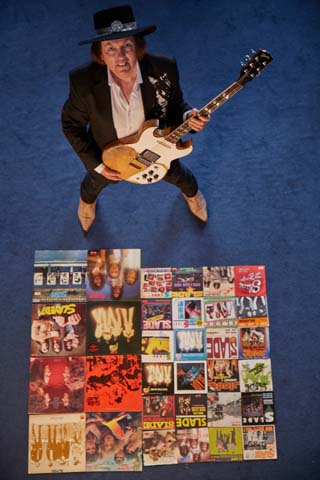 “We did have difficulties”
“We did have difficulties”
And having a good manager was obviously a bonus.
Yes. All the way though ’73 in particular… Chas would say to us ’You don’t realise how big you are”. And we never realised how big we were. We always thought we had to write another hit. We’d say “We’re not as big as the Beatles”. Chas would say “Forget the Beatles. You are now. You are the band of the seventies.” Having that support was great. What was interesting, while we were making the Christmas song in New York, John Lennon popped in. And he said to Chas Chandler, “I really like that singer. He sounds like me.”
Midlands humour is pretty unique so that probably helped you cope with fame.
Yes. With us we kind of had a great humour at laughing at things. I always see something funny in a situation… Especially in America because it’s such a vast country to try and work in. You come across extraordinary people when you’re famous. You get a lot of people coming up. A few ’cosmic types’.
We had four years of huge success. A lot of bands now are lucky to get 12 months. Never mind the kind of songs we had. And also records were selling in their hundreds of thousands. Not like now. With 10,000, you’d be number one. In them days you had to have hundreds of thousands to get to number one. Records were all and everything to people. Plastic records. Vinyl. The ritual. We did have difficulties like every band does. You do change. I didn’t particularly change because I had the same focus in my life as respects a group that I did when I left my first job to become professional.
“Paid dividends”
So why did the original Slade split up?
Obviously, individually you do get change. A band will break up. In some cases fall out. We weren’t a fat lot different from that. Nod, our singer, decided he didn’t want to do it anymore. He didn’t want to make records, didn’t wanna go on the road, and I understand that and I wrote about it in my book. Nod and I are great friends. I’ll always be glad that we were the band we were.
The revamped Slade has obviously brought those classic songs to a new and different audience.
It’s paid dividends to me because I’ve been to places we’d never have gone. Like Russian and eastern bloc countries. I can’t imagine how Russian fans, for example, would react to a Midlands group. Russians might know all the songs but they don’t speak very good English, but they have a way of telling you how much they love a good working class groups with a working class background.
“Natural step”
You document that rise to fame and life in post-war Britain in your autobiography.
Yes. It’s good to write about it because I want my grandkids to read it. When I’m not here, they can read about what it was like in them days. I think my generation will become like a period drama because of rationing. I remember what it was like when you couldn’t get oranges or whatever. If you look round the area where I come from, back in the late 1940s, it was a bomb site because of the war. I love technology but in the days I grew up, the aspect of imagination was far greater with us. We didn’t have everybody looking at the same page on a laptop.
Slade in Flame is my favourite rock film of all time. What are your memories of making it?
We thought ’We need to make a movie’, and our manager wanted us to make a movie as it’s a natural step. When we had the concept of the film, we didn’t want to make a carbon copy of A Hard Day’s Night, though I thought it would be fun. We wanted to make something that was a little longer lasting about the business; what it was like. So it had a rock edge to it. We had to get used to being on location. So we learned how to sort of act. It was a good experience. After we made that film we used to watch other films and know how they made those shots. We didn’t think the film would be rated like it is now.
“Trying to survive”
What was the reaction to the film overseas?
When we went to America, they showed it in St Louis, and the people couldn’t understand a word we said. And the Beatles had a similar problem with their diction. (The locals would say) “What sort of English is that?” I think it stands up along with that film (Mick) Jagger made in Performance. It’s one of them cult films. It was about trying to survive or become successful. When it was first released, I was concerned it was too heavy, watching people arguing.
‘How Does it Feel?’ from that film is one of my favourite Slade songs.
It’s Noel Gallagher’s favourite. He said ‘It’s one song where the words in that never dates.’
‘So Here It Is’ by Dave Hill is out now
All images of Dave Hill: Chris Floyd
